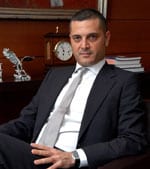STAYING THE COURSE
By Gordon Platt
Turkey has bounced back from a sharp economic contraction to become one of the region’s best performers. Its prospects are brighter than ever.
Turkey’s constitutional referendum last month gave a boost to prime minister Recep Tayyip Erdogan’s ruling AK Party, as voters approved 26 amendments to the country’s 1982 Constitution. The poll was an important test for the government ahead of next year’s general election.
The AKP says the amendments are needed to modernize Turkey’s democracy and improve its chances of becoming a member of the European Union. The victory for the AKP also could help Turkey move toward an investment-grade credit rating. The country’s leaders have pledged to stay the course on economic reforms.
Turkey has a solid core of well-managed companies that are creditworthy and in a sound financial position. This has helped the country’s banks to raise their asset quality.

“Turkish corporates have studied the lessons of the 2001 crisis in Turkey; [they know] how to manage cash flows and how to revolve their debts,” says Tolga Egemen, executive vice president of Garanti Bank.
During the recent financial turmoil Turkey’s economy has performed better than most other emerging-market and developed economies, on the back of manageable levels of government debt and a sound financial sector, Egemen says. “As a result, Turkey was one of the very few countries to receive ratings upgrades from all three major rating agencies during the post-crisis period,” he says.
The average age of Turkey’s 76 million people is 28 years. In contrast to the rapidly aging populations in the US, Europe and Japan, the increasing consumer purchasing power of Turkey’s youth offers an attractive market to investors.
Süreyya Ciliv, CEO of Turkcell, the leading communications company and technology provider in Turkey, says, “The future is sparkling with the growing young population, who are fast and agile adopters of mobile and Internet products and applications.” To keep up with projected market demand, Turkcell has been churning out at least one patent application a month.
“The telecom sector was spurred by the launch of 3G [third-generation] mobile technology at the peak of the global financial crisis,” says Ciliv, a former Microsoft executive. “Turkcell played a key role in the launch of 3G in Turkey at the end of July 2009,” he says. “We are happy with the interest in 3G. The number of subscriptions on our system in the first year was approximately 6 million, roughly half of whom are active 3G users.”
Turkcell has 33.9 million customers in Turkey, giving it a market share of 55%. The company also has interests in international mobile-telecom operations in Azerbaijan, Belarus, Georgia, Kazakhstan, Moldova, Northern Cyprus and Ukraine. When added to its Turkish operations, that gives Turkcell approximately 62 million subscribers.
“Turkey is a fast-rising economic power,” Ciliv says. “Our top companies are internationally competitive, turning our youthful nation into an entrepreneurial hub, tapping cash-rich export markets, while attracting billions of investment dollars in return.”
 |
|
Egemen: “Turkish corporates know how to manage cash flows ” |
Turkcell became the first Turkey-based company to be listed on the New York Stock Exchange on July 11, 2000. “Being listed on the NYSE makes Turkcell a leader and example to, and role model for, the Turkish business community, and a magnet for foreign investors who wish to enter the Turkish market,” Ciliv says.
International observers cannot miss Turkey’s economic transformation, Ciliv says. “Just a decade ago, Turkey had a budget deficit of 16% of gross domestic product and inflation of 72%, and now it is fulfilling the EU’s fiscal guidelines,” he says.
Bouncing Back
Turkey’s flash recovery from the global economic downturn has been impressive. The country’s GDP rose at a 6% annualized rate in the fourth quarter of 2009 and nearly 12% in the first quarter of 2010. There was barely any letup in the second quarter, with growth of 10.3%. “We have never had second thoughts about Turkey’s weathering the global financial crisis successfully, and we have continued to provide loans regardless of prevailing conditions,” says Hüseyin Aydin, general manager of Halkbank. The bank has set a target of 25% growth in loans in 2010. “We are now reaping the fruits of the intensive work we have been conducting in close cooperation with small and medium enterprises,” Aydin says.
 |
|
Acikalin: “There are outstanding areas of dispute between Turkey and the EU” |
SMEs are taking steps to keep their books in order, and banks, in turn, are better able to extend loans based on solid criteria, he says. One-fourth of all Turkish SMEs using banking products are Halkbank customers. While net interest margins have narrowed, the banking system is still profitable and efficient because volumes have also increased, Aydin says. The Turkish banking sector not only survived the global financial crisis without government assistance, but it also operated profitably.
Omer Aras, chairman and group CEO of Finansbank, says the energy sector is one that will benefit significantly from the growth in Turkey’s economy. “Electricity demand is expected to grow by 7%, on average, each year for the next decade, thanks to industrialization, increasing urbanization and population growth,” Aras says. “Hence, Turkey would need to double its current installed capacity, which will require an investment of $3 billion to $4 billion a year.” Power plants and three electricity distribution areas will be privatized, bringing the government proceeds of more than $20 billion, he says.
The construction industry has always been the main driver of Turkish economic growth, according to Aras. “The sector will foster economic growth in the upcoming years, thanks to its interaction with a variety of sub-sectors,” he says.
The tourism industry is also important, in part because of Turkey’s “enviable” position between three continents, Aras says. The sector is expected to generate income of $25 billion in 2010. The main growth in the future will come from such areas as cultural tourism, spas, golf, mountain hiking, winter tourism, exploring caves, yachting, scuba diving, parachuting and other specialized niches, he says.
Healthcare is another promising sector because of Turkey’s large population and the growing penetration of health insurance throughout the country, Aras says. New private investments are being made in hospitals, and the first public-private partnership projects are going to be introduced in the health sector, he says.
Turkish banks have proven remarkably resilient relative to their peers in other emerging markets and developed markets during the global financial crisis, Aras says. “This was mainly due to the lessons learned during the banking crisis Turkey lived through back in 2001, which has prompted wide-ranging reforms and resulted in a healthy consolidation in the sector,” he says.
Corporate and commercial banking will continue to be the core operating areas of Finansbank, even as it has increased its product offerings to the retail segment in recent years, Aras says. “We are planning to maintain our strong position in corporate and commercial segments by supporting project finance transactions, using syndications and club loans, providing corporate loans and trade finance.”
The main downside risk to Turkey’s economic growth is potential slowing in the global economy, Aras says. “Being a convergence country, Turkey’s growth rate will continue to outperform that of the advanced economies,” he says. Coupled with the fact that marginal productivity of capital in Turkey is high, this will keep Turkey an attractive destination for capital inflows, he says.
 |
|
Istanbul: There were never any second thoughts about Turkey weathering the crisis |
“Turkey is the most prominent economy of the region,” says Ziya Akkurt, CEO of Akbank, who likes to compare Turkey’s performance with that of other big emerging markets, such as Brazil and China. “The potential of the Turkish economy requires the need to lift the pace of economic growth,” he says. Akbank issued loans and credit totaling more than 100 billion Turkish lira ($67 billion) in the first half of 2010. Loans to SMEs and corporations increased by 19%, and consumer loans by nearly 20% in the first half.
Consumers Show Faith
Turkey’s positive economic developments this year have lifted consumer confidence and expectations, Akkurt says. Akbank has kept its nonperforming loan (NPL) ratio well below the sector average and on a declining trend, despite the bank’s increased lending. “Risk management is a critical issue that should be approached with diligence, not only during crisis periods but also through periods when the economic outlook is positive,” Akkurt says.
Akbank’s NPL ratio stood at 3.8% at the end of 2009, fell to 2.9% at the end of the first quarter of 2010, and declined further to 2.5% at the end of the second quarter.
Turkish banks increased their lending by 17% in the year-to-date through August 20, 2010. In the same period, the NPL ratio for the industry dropped to 4.3% from 5.3% at the end of last year. “This improvement is attributable not only to volume growth and NPL sales but also to a solid decline in NPL formation,” says Faik Açikalin, CEO of Yapi Kredi Bank.
Like other Turkish banks, Yapi Kredi is not only increasing lending but is also expanding its branch network. “We opened 24 new branches this year through August, bringing our total network to 859 branches,” Acikalin says. “We are committed to meeting our target of opening about 50 or 60 new branches in 2010.”
Turkey’s economic recovery followed a sharp contraction in 2009 that provided a low base from which to bounce back. Historically low interest rates, a relatively sound banking sector, and a recovery in export growth aided the recovery, Acikalin says. “Concerns as to whether Turkey can ride through a period of weak European growth are relatively eased due to the country’s more diversified export base, with less than 50% of exports to the EU area,” he says. Turkey’s full-year growth in 2010 will be greater than 5%, putting the country at the top of the regional growth league, he says.
With inflation likely to improve over the next six months, Yapi Kredi and other banks expect interest rates to remain stable. The Central Bank of Turkey has held its overnight interest rate at 6.5% this year.
Turkey’s drive for EU accession has continued to provide an anchor for reforms in Turkey, Acikalin says. Turkey secured EU candidate-member status in December 1999, and formal accession negotiations began in October 2005. “But there are outstanding areas of dispute between Turkey and the EU, making near-term accession almost impossible,” Acikalin says. However, Turkey is an important partner for the EU, just as the EU is an important trading partner for Turkey, he adds. “The tendency will hence be that the negotiations will slowly progress, but without a clear timetable for actual accession,” Acikalin says. “Indeed, both sides appear content to view accession as a long-run goal.”
The prospect of Turkish EU accession should continue to provide an underpinning for the reform process in Turkey, as well as for foreign direct investment. “From an FDI perspective, Turkey’s large domestic market and improving business environment are key drivers for inflows,” Acikalin says. The existing customs union with the EU also provides trade access to the EU for Turkey, which remains a key attraction for foreign investors, he adds.

Meanwhile, Turkey is strengthening economic ties with the Arab world, with which it shares cultural and religious values. Not only does it have long-term plans to transport gas from Arab countries to Europe, but it also hopes to attract significant investment from the Arab Gulf. Turkey has agreed to form a customs union with Lebanon, Jordan and Syria that eventually could extend across North Africa. Turkey’s construction firms are already at work in 80 countries, including many in the Middle East.
Islamic Finance Grows
Turkey’s population is 95% Muslim, and the Islamic finance industry in the country, though quite small, is growing fast. The banks now operating under the name of “participation banks” had the status of “special finance houses” until 2005. The special finance houses offered interest-free banking, or what is known across the world as Islamic banking. However, they were not completely subject to the banking law and encountered problems of representation and confidence.
Following amendments to the banking law in 2005, participation banks were fully integrated into the system. The fact that they now have a 5% share of the banking market may seem modest, but it is more than double the 2.44% of the market it represented in 2005, says Yunus Nacar, CEO of Turkiye Finans. “I expect the share that participation banks have in the assets of the banking system will rise to about 10% in a few years, owing to the current momentum of growth,” Nacar says.
Turkiye Finans, 60% of which is owned by Saudi Arabia’s largest bank, National Commercial Bank, offers its customers all of the products available at commercial banks, as long as no interest is charged. However, the use of sukuk, or Islamic bonds, is a new issue on the agenda in Turkey, Nacar says. “Such assets are created by leasing transactions, and these assets must comply with the participation banking principles,” he says. “The participation banks presently carry very small amounts of these assets on their balance sheets.”
The expansion and spread of sukuk in the Turkish market also requires new tax regulations, Nacar says. As it stands now, companies issuing Islamic debt are taxed twice: once when they lease assets backing the debt, and again when the assets are sold. “The government introduced income-indexed notes in 2008, thereby attracting global investors’ interest through interest-free products,” Nacar says. “Considering that the sukuk product will have the same result, we can say that there will be developments exciting to investors in international markets.”
In August, Kuveyt Türk, a participation bank in which Kuwait Finance House holds a 62% stake, issued $100 million of three-year Islamic notes, in the first sukuk sale ever by a company in Turkey. While the issue was well received, it was only available in the international market and not in Turkey. Kuveyt Türk says more regulatory changes are needed to encourage the development of the sukuk market. Turkish finance minister Mehmet Simsek said earlier this year that Turkey wants to expand its shariah-compliant financial services to attract more investment from the Arab Gulf. The Kuveyt Türk sukuk could pave the way for Turkey to issue a sovereign sukuk next year, which would give the sector a big lift, bankers say.



